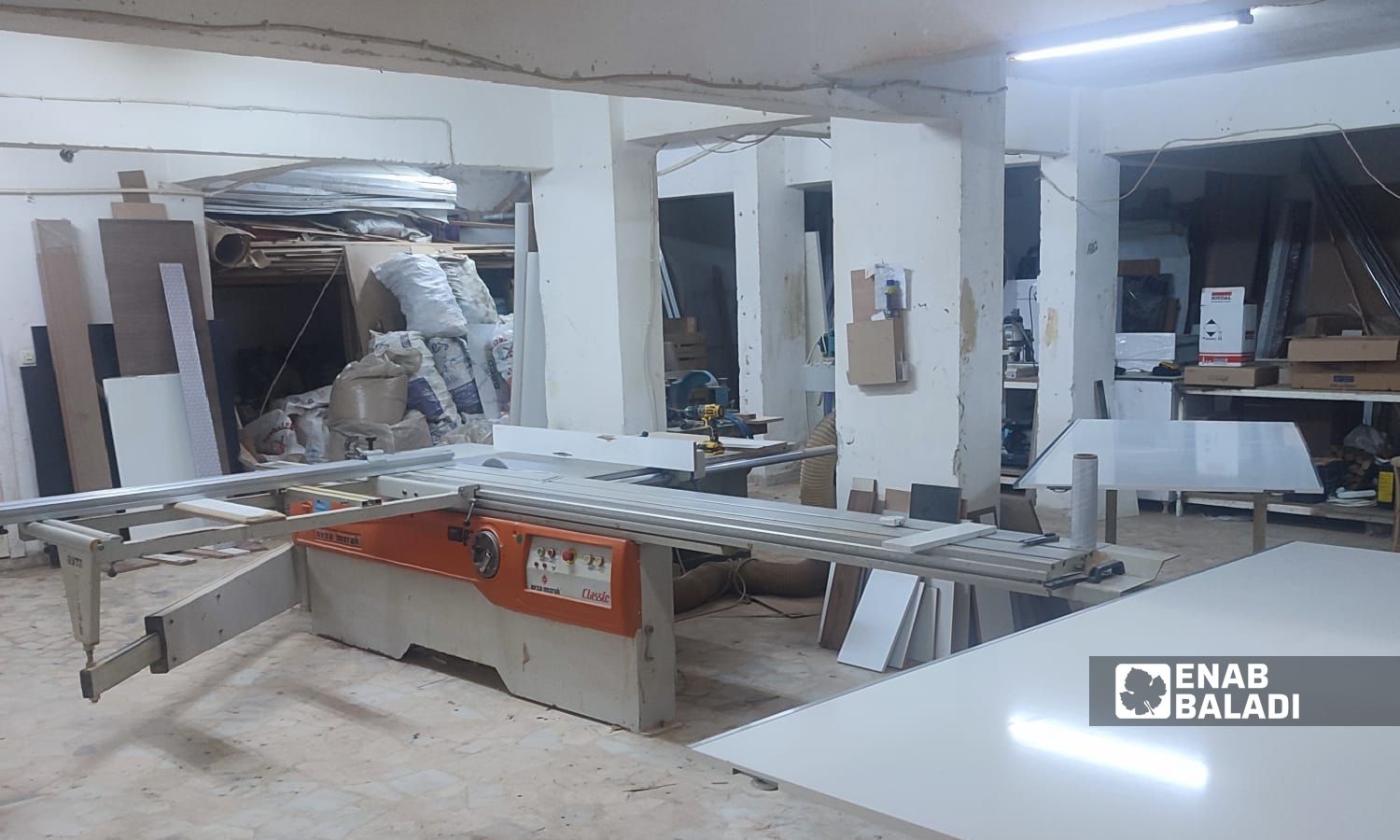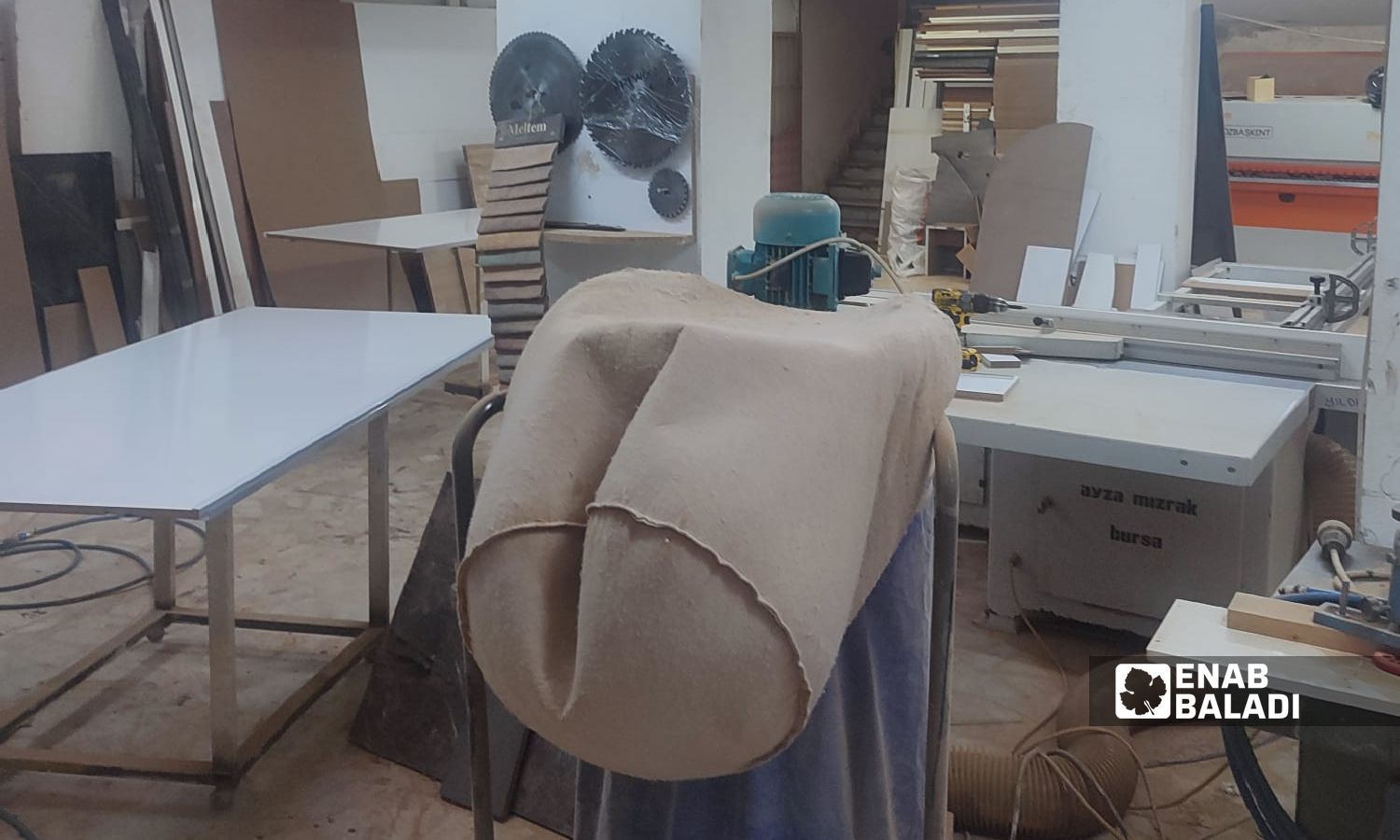



Enab Baladi – Hassan Ibrahim
“There is not always work, and this profession does not provide a good salary.” With these words, Wael, a 26-year-old young man from the town of Daraya in Damascus countryside, summed up the reasons for his reluctance to pursue furniture carpentry in Turkey.
The young man, who resides in the Turkish city of Bursa, left the profession he had been practicing since his childhood, and for which his city was famous, because there was not much work year-round, and because of its low financial returns, heading to upholstering furniture as it is an uninterrupted profession and its monthly income is high compared to the income received as a furniture carpenter.
The carpentry profession is widely spread in Daraya and has accompanied its residents, who have been displaced from their city for the past ten years to everywhere they went, as it is one of the legacies of its inhabitants and a source of income for many of its families.
The spread of the carpentry profession in the Turkish city of Bursa does not mean that it is the best profession in terms of financial returns, says the young man who explained to Enab Baladi that its popularity in the city is due to the large number of trees and different types of timber.
With the advent of winter, demand decreases and the carpentry labor market wanes, and many workers in the profession lose their jobs, according to the young man, who indicated that he knows many people who are skilled and professional furniture carpenters, but they do not practice it; in fact, they opt for other professions such as blacksmithing, furniture upholstery, and other jobs.
The said profession, which necessitates innovation, creativity, and professional design, is full of hazards, as the use of sharp tools makes its workers vulnerable to serious injuries; you would rarely come across young persons in the profession who have not suffered physical injuries during their work.
Ismail, 29, another young man from the city of Daraya, is still working intermittently in the carpentry and door installation profession with his companions and workshop owners scattered in Istanbul, despite the young man’s use of the delivery service as a main occupation and a constant source of income.
The young man explained to Enab Baladi that the financial return of the carpentry profession is good for workshop owners, but it is not rewarding for the workers. Furniture carpentry needs considerable capital, so the young man left the profession due to the high cost of equipment and requirements, such as the necessity to own vehicles to transport workers and timber when some projects are completed in residential complexes.
Since his departure from Daraya in 2016, Ismail has entered Turkey and worked at a carpentry workshop in Esenyurt, Istanbul. He was nevertheless surprised by the amount of effort and pressure placed on the worker. A profession of creativity, as he put it, should not turn a person into a “porter.”
The owner of the workshop in which Ismail worked requires workers to load and transfer hundreds of doors and windows to residential complexes without the assistance of specialized transport workers, which exhausts workers and eliminates the craftsmanship and creativity aspects.
The physical dangers of the profession left their mark on Ismail’s body, as he lost one of his fingers during cutting and sawing wood, in addition to another injury that caused him to lose part of the fingers of his second hand.
The young man residing in the Fatih district, central Istanbul, visits his Daraya-native colleagues in the profession, pointing out that most of them had turned to other professions such as sewing, installing water networks, delivery services, and several other professions.
Skilled professionals’ refrain from practicing furniture carpentry does not mean that the profession has disappeared. Carpentry workshops are spread in many Turkish states, with some of them specializing in specific products such as furniture for the homes of newlyweds and kitchen equipment, etc.
“The smell of raw wood, engraving on it, adapting it and turning it into different pieces and manufactures,” a profession of which Alaa, 31, is fond. He is the owner of a furniture carpentry workshop in the Esenyurt area, and he insists on practicing the profession despite all challenges.
Alaa explained to Enab Baladi that he had faced many difficulties at the beginning of his career but persevered alongside his partner Muhannad (32 years old).
Opening the workshop was not easy. The lack of a network of customers and the high prices of required equipment were the most significant obstacles that hindered the beginning of the two young Daraya-based men’s careers.
Alaa rented a shop with the tools of the profession, which made it easier for him to search for new tools and reduced costs, in addition to owning a car that reduced transportation fees and enabled him to accept job offers in distant locations.
The two young men kept their patience during the beginning of their careers. Over time, they were able to make a good impression with clients and compound contractors regarding their work and endeavor to leave a creative mark while benefiting from accumulated experience.
According to Alaa, the market is sometimes stagnant. But the work in their workshop is not interrupted, as the two young men are perfecting the work in all furniture supplies related to timber, such as bedrooms and models of doors, offices, and kitchens.
Many workshops, professions, and companies are active in Turkey, which convey the culture and heritage of the Syrian people to the Turkish people and leave their mark in many sectors.

Equipment inside a furniture carpentry workshop in the Esenyurt region on the European side of Istanbul – 1 September 2022 (Enab Baladi)
Leaving destroyed and burned wood workshops and warehouses behind, the carpenters of Daraya had moved their profession to the cities and countries of displacement since their displacement in late 2012, when the city was handed over permanently to the Syrian regime after a committee representing the city’s factions struck an agreement with it to evacuate the city in August 2016.
The number of workshops, workers, and sales halls in the city, which had experienced years of siege and bombing, decreased after times when certain workshops used to export their products to the Syrian governorates and the Jazira region.
At the same time, the Syrian regime’s media are promoting recovery in craft industries in regime-held areas, including the city of Daraya. The state-run al-Baath newspaper said last March that craft industries were rapidly booming in the countryside of Damascus, especially Daraya.
Quoting the head of the local council, Marwan Obeid, the said newspaper stated that the number of workshops operating in the city reached 100 blacksmithing workshops, 100 carpentry, and aluminum workshops, and 70 shops.
Daraya had a furniture market and more than 2500 furniture-manufacturing workshops, according to a statistic published by the al-Baath newspaper in 2005, quoting the former mayor of Daraya, Mohammad Mazhar Sharbaji.
The workshops were spread in southern Daraya and al-Thawra Street, which connects the city’s southern and northern sections and its branches. The furniture market is the largest and most famous in the city.
According to previous testimonies of merchants contacted by Enab Baladi, the number of workshops increased in the years prior to 2011, especially in slum areas on the outskirts of the city. Some carpenter supplies dealers in Daraya estimate that more than 10,000 carpenters were employed in the city.
if you think the article contain wrong information or you have additional details Send Correction